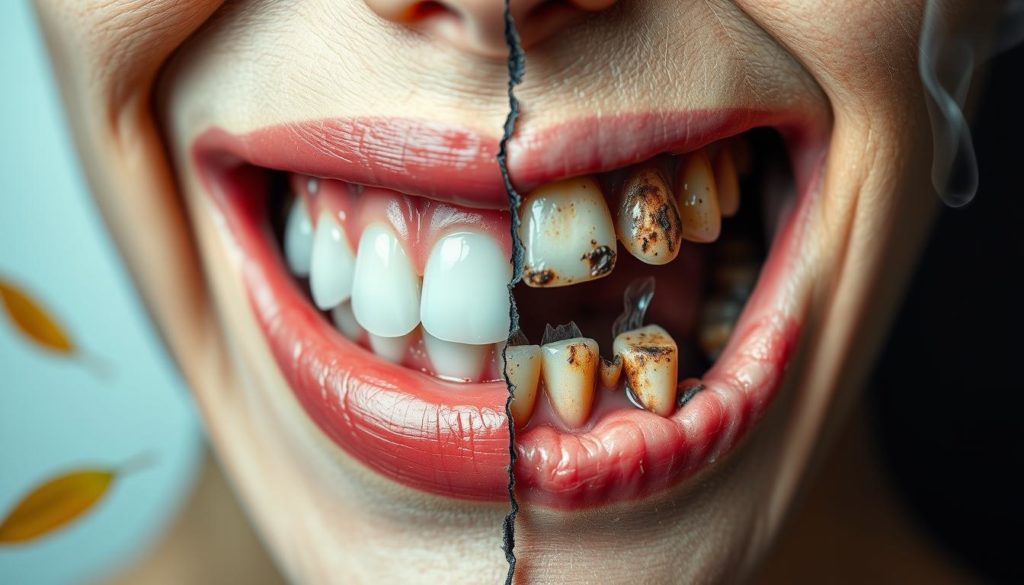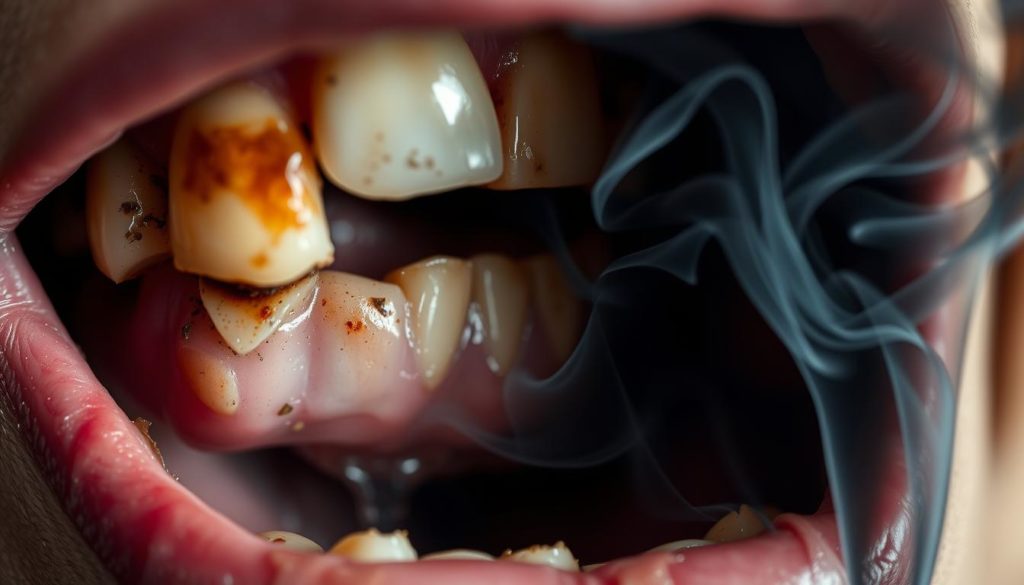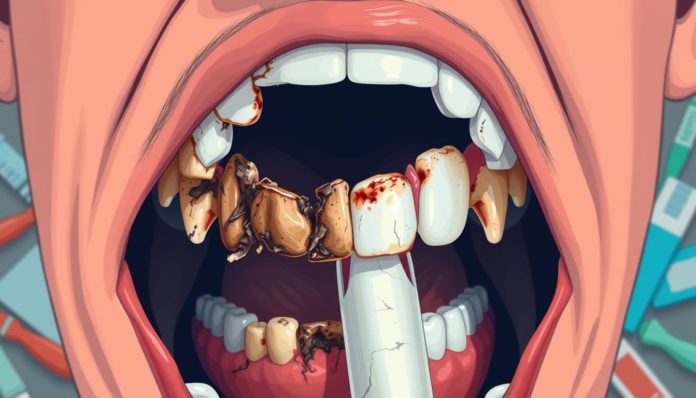Did you know smokers are up to twice as likely to get gum disease as non-smokers, says the CDC? This shows how big of a problem smoking is for our mouths. It can cause tooth discoloration, bad breath, and even serious problems like tooth decay and oral cancer. But, there are steps we can take to lower these risks.
This article will look at how smoking harms our mouths and give tips to avoid dental problems. We’ll talk about the bad effects and share ways to keep your mouth healthy, even with smoking.
Introduction to the Impact of Smoking on Oral Health
Smoking greatly affects oral health, leading to many dental problems. The CDC says smokers often get plaque, gum recession, and tooth loss. These issues happen because smoking messes with the mouth’s balance, making it hard to stay clean.
The dental health effects of smoking go deeper than just visible problems. Nicotine in cigarettes narrows blood vessels, cutting off blood to the gums. This weakens the mouth’s defense, making it harder to fight off infections. The ADA notes that smokers struggle more to keep infections at bay, which can get worse fast.

The NIDCR explains how smoking changes the mouth’s bacteria. This change makes smokers more likely to get infections. Knowing how smoking affects oral health shows it creates a bad environment in the mouth, where harmful bacteria can grow.
It’s important to understand the dental health effects of smoking to make smart choices about smoking. This knowledge helps in making better decisions and getting the right dental care.
Dental Health Effects of Smoking
Smoking is bad for your teeth. It’s important to know this, especially when you’re trying to quit smoking and take care of your mouth.
Tooth Discoloration
Cigarettes stain teeth with tar and nicotine. Over time, teeth can turn yellow or brown. This not only makes your smile less appealing but also shows you need to take better care of your teeth.
Bad Breath
Smokers often have bad breath. Bacteria in the mouth, caused by tobacco, leads to this problem. Quitting smoking and taking care of your mouth can help get rid of bad breath.

Tooth Decay
Smokers are more likely to get cavities and tooth decay. Tobacco harms the teeth’s enamel and gums. It’s crucial to follow good oral hygiene tips to protect your teeth and gums.
Smoking and Oral Health
It’s key to know how dental health effects of smoking to keep your mouth healthy. Smoking weakens the immune system, making it hard for the body to heal, including in the mouth. This makes recovery from injuries and surgeries slower, harming your oral health.
The Centers for Disease Control and Prevention (CDC) says smoking hurts the immune system. This leads to more infections and slower healing from things like tooth extractions. Smokers also face severe gum problems like gingivitis and periodontitis because they can’t fight off these diseases well.
Quitting smoking is very important for your mouth’s health. It lowers the risk of serious problems like oral cancer and severe gum disease. The Oral Health Foundation notes that smoking and drinking alcohol together can increase oral cancer risk by up to 30 times. This shows how quitting smoking is crucial for your mouth’s health.
Here’s a table showing how smokers and non-smokers differ in oral health:
| Aspect | Smokers | Non-Smokers |
|---|---|---|
| Gum Disease | Higher Risk | Lower Risk |
| Healing Time | Slower | Faster |
| Tooth Discoloration | Severe Staining | Minimal Staining |
| Oral Cancer Risk | Up to 30x Higher | Significantly Lower |
Understanding the importance of quitting smoking for oral health can lead to big changes. Quitting smoking brings quick and lasting benefits, improving your oral hygiene and lowering the risk of serious problems. So, quitting smoking is not just good for your health in general but also vital for a healthy, bright smile.
Smoking-Related Gum Disease
Smoking is a big risk for gum disease. The American Dental Association (ADA) says smokers get more plaque. This plaque leads to gum infections.
Preventing dental problems from smoking is key, especially for gums. The National Institute of Health (NIH) says smoking hurts gum tissue cells. This makes smokers more likely to get periodontitis.
Smoking makes gum disease worse faster. But, quitting can help. Gums start to heal and fight off infections better.
- More plaque forms
- Less blood flow to gums
- Weaker gum tissue cells
Knowing these points helps fight dental problems from smoking. It also improves your mouth’s health.
Oral Cancer Risks for Smokers
Oral cancer is a serious problem for smokers. The CDC says thousands of Americans die from it every year. Tobacco use makes this risk much higher. The American Cancer Society notes that at least 80% of oral cancer patients smoke.
Smoking does more than harm the lungs; it’s also bad for the mouth. Tobacco exposes the mouth’s tissues to harmful substances. This can cause mutations and potentially lead to cancer. It’s very important to stop smoking and take care of your mouth.
“Tobacco use is linked to approximately 75% of oral cancer cases. Regular dental check-ups and early screening can save lives.”
Knowing the risks of oral cancer for smokers is key to making good health choices. Quitting smoking and taking care of your mouth can lower your risk. It also makes you feel better overall.
Here’s a look at how oral cancer affects smokers versus non-smokers:
| Category | Smokers | Non-Smokers |
|---|---|---|
| Prevalence of Oral Cancer | 80% | 20% |
| Risk Increase | 5-10 times more | Baseline Risk |
| Survival Rate | 50% lower | Higher |
Prevention Strategies for Smokers
Smokers face unique challenges to their oral health. But, embracing certain prevention strategies can make a big difference. Here’s what you need to know to keep your teeth healthy, even if you haven’t quit smoking yet.
Regular Dental Check-ups
The American Dental Association (ADA) says you should see your dentist every six months. Professional cleanings and catching problems early can stop bigger issues. Regular visits help track changes in your mouth, which is key for smokers.
Maintaining Oral Hygiene
For smokers, brushing and flossing well is very important. The Centers for Disease Control and Prevention (CDC) stress the need for good oral hygiene to fight smoking’s effects. Following these tips can help lower plaque and tooth decay.
Using Mouthwash
Therapeutic mouthwash, as the American Dental Hygienists’ Association (ADHA) suggests, can boost your oral health. It helps reduce plaque and gingivitis. Using mouthwash adds to your daily oral care, showing how quitting smoking is crucial for your mouth.
| Strategy | Benefits |
|---|---|
| Regular Dental Check-ups | Early problem detection and professional cleaning |
| Maintaining Oral Hygiene | Reduced plaque, tooth decay, improved overall oral health |
| Using Mouthwash | Decreases plaque and gingivitis |
Oral Hygiene Tips for Smokers
Keeping your mouth healthy while smoking is tough, but it’s key to fight dental problems. Here are some tips to help you keep your teeth in good shape.
Brushing Effectively
The American Dental Association says brushing twice a day is crucial. Use fluoride toothpaste and a soft-bristled toothbrush. Spend at least two minutes on each tooth surface.
Flossing Daily
The Academy of General Dentistry stresses daily flossing. It removes plaque between teeth and under the gumline. This helps prevent gum disease and tooth decay.
Healthy Diet
The Mayo Clinic suggests eating fruits, veggies, and nutrient-rich foods. A balanced diet helps counteract smoking’s dental harm. It also boosts your overall health.
By sticking to these oral care tips, smokers can manage their dental health better. This reduces the dangers of tobacco use.
Importance of Quitting Smoking for Oral Health
Quitting smoking is the best way to prevent oral health problems linked to smoking. It’s crucial for your mouth’s health. The Centers for Disease Control and Prevention (CDC) says quitting smoking lowers the risk of gum disease and oral cancer. These benefits start to show soon after you stop smoking.
Just a few weeks after quitting, you might see better oral hygiene. This includes less bad breath and healthier gums. Quitting smoking can save your life, especially when it comes to oral cancer risks. The American Heart Association notes that former smokers’ risk of gum disease drops close to that of non-smokers in a few years.
The World Health Organization (WHO) also points out that quitting smoking can make your teeth whiter and gums healthier. These changes show how quitting smoking is key for your dental and overall health. It helps you avoid oral cancer risks and keeps your smile bright and healthy.
FAQ
What are the dental health effects of smoking?
Smoking can cause many dental problems. These include tooth discoloration, bad breath, tooth decay, and gum disease. It also raises the risk of oral infections and cancer.
How does smoking affect gum health?
Smoking is a big risk for gum disease. It leads to bacterial buildup and infections. It also harms gum tissue cells, making smokers more likely to get periodontitis.
What are the risks of oral cancer from smoking?
Smokers face a higher risk of oral cancer. The CDC says most oral cancer cases in the U.S. are linked to tobacco use.
Can smoking affect my breath?
Yes, smoking can cause bad breath. This is because of bacteria and chemicals in tobacco.
How can I prevent dental problems caused by smoking?
Regular dental check-ups and good oral hygiene are key. Using mouthwash and eating healthy can also help. Quitting smoking is best for your mouth’s health.
What are the benefits of quitting smoking for oral health?
Quitting smoking lowers the risk of gum disease and oral cancer. It also improves breath and reduces tooth staining. Your mouth’s health will get better overall.
Why is oral hygiene particularly important for smokers?
Smokers face more dental problems, so good oral hygiene is crucial. Brushing twice a day, flossing daily, and using mouthwash helps manage plaque and prevent infections.
How does tobacco use impact oral health?
Tobacco use increases the risk of gum disease, oral cancer, tooth loss, and infections. It also causes plaque buildup and restricts blood flow in gums, making infections harder to fight.
Are there specific dental care products for smokers?
Yes, there are products like fluoride toothpaste, soft-bristled toothbrushes, and mouthwashes for smokers. These help manage plaque, reduce staining, and keep your mouth clean.
Is it essential to visit the dentist regularly if I smoke?
Absolutely. Regular dental visits are crucial for smokers. They help catch issues early, get cleanings, and get advice on oral health.


